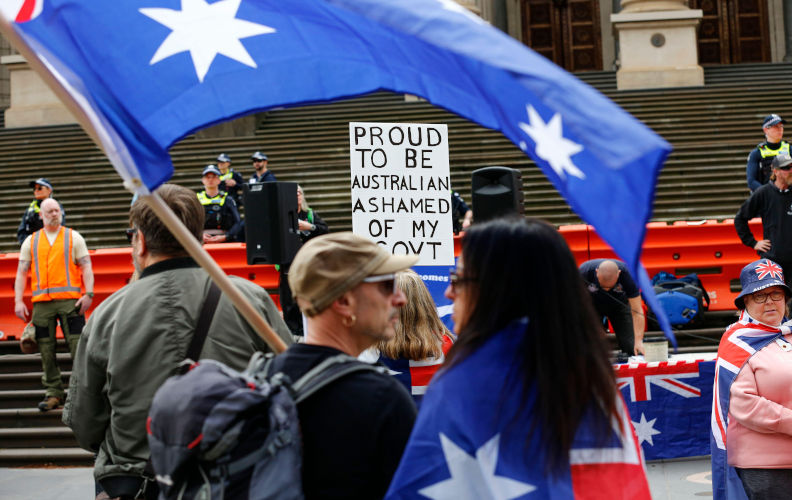Palestine, hate and the fantasy of White Australia
October 2, 2025
Last week, as the prime minister confirmed Australia would recognise Palestine, far right protesters still hit Melbourne’s streets.
The contrast could not be starker. Inside Parliament, a government signals that justice must extend beyond our borders; outside, a few thousand marchers perform a pantomime of hate.
It is tempting to unpack their rage, but they are not the story. In a city of five million, their 10,000-strong procession is little more than white noise. The real story is who we are, how we came to be and what recognition means.
Australia has never been a singular tale. It is a mosaic. In my home town of Shepparton, I was embraced by my friends’ Italian grandparents, who fled war zones and endured slurs like “dago”. My own family tree runs through Sweden, Germany and Poland. And before all of us lies the most ancient continuing culture on Earth, whose stories survive despite centuries of erasure.
This pulse of diversity is everywhere: in Lygon Street cafés, in Adelaide dumpling houses where recipes cross oceans, in the Uber driver from Africa who calls Brisbane’s South Bank paradise because her children can walk safely and in the quiet eyes of an Indigenous elder in Darwin, telling how he was taken from his family.
Against this backdrop, the rhetoric of purity collapses. Senator Jacinta Nampijinpa Price warns of Indian migration as a political threat, echoing the same distrust once directed at First Nations people. Bob Katter, denying his Maltese ancestry through violence, acts as though erasure is patriotism. Racism here folds back on itself, revealing absurdity.
The facts are clear. Net overseas migration reached 487,820 in the year ending April 2024. Nearly one in three Australians were born overseas; almost half have at least one parent from abroad. This is not invasion but survival. It is the rhythm of who we are.
Globally, the delusion grows thinner. Caucasians represent just 16% of the world’s population. The fantasy of white dominance is statistically laughable.
This is why Palestine matters. Recognition is not a grand gesture of foreign policy but a symbolic reminder: cultures can co-exist and be acknowledged on the basis of human rights. Yet, symbolism without action is hollow. Even as Australia recognises Palestine, it continues to sell arms to Israel – a stark contradiction that exposes the limits of political courage. Recognition without responsibility risks being theatre while the machinery of war continues.
And in our own land, the contradiction is deeper still. How can Australia recognise Palestine abroad while failing to reckon with its record of injustice toward First Nations peoples? Children remain in detention. Deaths in custody persist at alarming rates. Health, life expectancy and employment gaps between Indigenous and non-Indigenous Australians remain a national disgrace. To recognise Palestine, but ignore these truths, is to show empathy at a distance.
Still, symbols matter. To recognise Palestine is to affirm that voices long silenced must be heard. It does not annul complicity, but it gestures toward a more honest national story: survival through diversity, co-existence and dignity over purity myths.
Writers and artists have long known this. Nyadol Nyuon reminds us that “Australia’s strength is not in pretending we are uniform, but in celebrating that we are not”. Antigone Kefala wrote of exile and belonging: “in the silence of foreign tongues we built our own homeland.” Briggs, the Yorta Yorta rapper, says plainly: “Australia always wants Black culture, but never Black people.”
I imagine the flag-waving supporters of Dezi Bird Freeman, fuelled by resentment, absorbed in lives that undercut their slogans. They salute Hitler, then tap lattes on PayWave served by a Somali barista. They stomp boots, trip on kebab wrappers. They rage against globalisation while sitting on couches delivered by couriers from Pakistan, drinking beer in Taiwanese thongs, watching screens assembled in China. Their purity is a delusion unmasked by every purchase.
This hatred is not native. It is manufactured, sold by opportunists draping bigotry in nostalgia, selling fish-and-chip fantasy as patriotism, or raising fists at journalists. But their ideology is a costume that does not fit.
As Stella Miles Franklin wrote: “It is a sign of your own worth sometimes if you are hated by the right people.” Her words echo here. The recognition of Palestine is not triumph. It is a reminder. Our national story is multiplicity, not purity.
And the protesters? They are not central characters. They are hecklers at the edge of the stage, shouting lines nobody came to hear. The real performance happens elsewhere – in kitchens and classrooms, in libraries and workplaces, in friendships across difference. Now even in foreign policy, as Australia hesitates in its contradictions, it must decide whether recognition means more than words.
The views expressed in this article may or may not reflect those of Pearls and Irritations.

